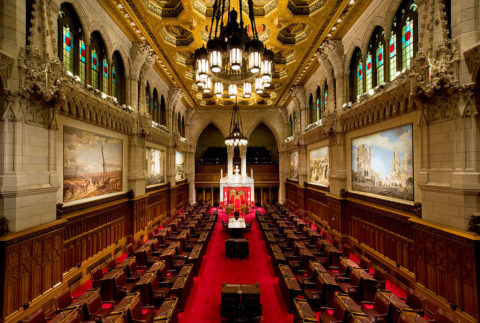My original headline for this piece was
I can’t believe I’m writing this, but we need to depend on Canada’s Senate to turn down Trudeau’s Emergencies Act
Fortunately, perhaps because Mr. Trudeau realized he might lose the vote in the Senate, he announced earlier today that the government will relinquish the powers granted under the Emergencies Act. The province of Ontario is also rescinding the state of emergency. This makes much of what follows less immediately relevant, but I’m too lazy to delete it I feel it still has some informational value to offer:
I’ve never had much faith in our Senate — and given that most Prime Ministerial appointments to the upper house are given as rewards to former political backroom organizers, bagmen, and the occasional prominent citizen, the role of the Senate in daily life is virtually nil. Now, thanks to a provision of the Emergencies Act, our last chance of prying the undemocratic emergency powers Trudeau has claimed is to have the Senate vote against the use of the act. This is not how the upper house normally operates.

“In the east wing of the Centre Block is the Senate chamber, in which are the thrones for the Canadian monarch and her consort, or for the federal viceroy and his or her consort, and from which either the sovereign or the governor general gives the Speech from the Throne and grants Royal Assent to bills passed by parliament. The senators themselves sit in the chamber, arranged so that those belonging to the governing party are to the right of the Speaker of the Senate and the opposition to the speaker’s left. The overall colour in the Senate chamber is red, seen in the upholstery, carpeting, and draperies, and reflecting the colour scheme of the House of Lords in the United Kingdom.”
Photo and description by Saffron Blaze via Wikimedia Commons.
Even as it enables the government to take such far-reaching actions, the Emergencies Act provides safeguards against abuse. One such safety valve is that the government’s declaration of an emergency has to be approved, in short order, by both the House of Commons and the Senate in order to continue in force. In the Act’s words, “If a motion for confirmation of a declaration of emergency is negatived by either House of Parliament, the declaration, to the extent that it has not previously expired or been revoked, is revoked effective on the day of the negative vote.”
The House of Commons approved the motion to confirm the government’s declaration of emergency on Monday. It is up to the Senate to consider it now. And so, it may be useful to review the principles that govern the role of this much misunderstood and often maligned institution.
The Senate is not a deus ex machina that can rescue us from bad government. The suggestion, put forward by some of the “freedom convoy” leaders, that a constitutional chimera made up of the Senate and the governor general could oust the federal government and redress whatever grievances they came to air was arrant nonsense. For the most part, the Senate’s role in the government of Canada is very limited, and rightly so.
Senators are not elected and, as a result, lack the legitimacy to oppose the will of the House of Commons, whose members (the MPs) are, and the cabinet, led by the prime minister, which is responsible to the House of Commons. When the cabinet proposes that a law should be enacted, and the House of Commons agrees, constitutional propriety (a “constitutional convention”, in the jargon) dictates that the Senate’s role is limited to, at most, making suggestions for improving this law while respecting its general principle.
[…]
Will the Senate act independently? I do not know; I am just a boring law professor, and this question is above my pay grade. But I would like to conclude with an observation about how either answer to this question should make us reflect on the attitude the current prime minister and his predecessor have taken to the Senate.
If the Senate defeats Mr. Trudeau’s government, it will be in part because he cut his ties with what used to be the Liberal caucus there, releasing existing Liberal senators and new appointees to act with greater independence (though, in fairness, senators were always somewhat more independent-minded than MPs; not having to get re-elected does that to one). What may have seen a cost-free symbolic gesture might yet turn out to have been quite consequential.
Conversely, if the Senate ends up siding with the government, this will in part be because there are fewer Conservative senators than one might have expected. The reason for that is that Stephen Harper simply stopped appointing senators, in a fit of pique over the failure of Senate reform plans. That was a dereliction of constitutional duty ― the prime minister must fill Senate vacancies as they arise. And now, if not Mr. Harper himself, then at least many of his erstwhile supporters may come to regret that he did not.



